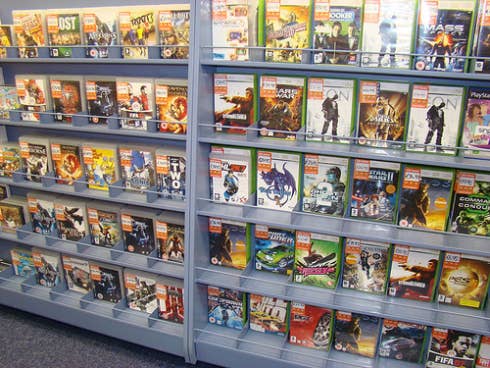The Real Cost of Used Games
Industry veteran Richard Browne is all for the rumored anti-used system in Orbis and next Xbox
Over the past few weeks there have been a number of articles appearing on websites across the globe fearing the concept that Sony and Microsoft are going to use, as GamesIndustry International itself put it, "the Nuclear Option" by blocking the ability to play used games on their next generation of hardware. Without fail, each and every one of these articles seems to take a damning view of this concept; even industry "analysts" like Michael Pachter have weighed in on what cost this would have to first party and third parties alike and how it would damage the industry, going as far as labeling the concept "evil". In truth it is nothing of the sort and what each and every article fails to account for is the REAL cost of used games.
I've been in this industry for 25 years, I've run development (internal and external) for seven different publishers. Used games were never, have never, been an issue to any of them. Today that actually still holds true; publishers don't hate used games, but they do hate the practices of GameStop and those that followed to force used games upon their customers - if you want to hear about nuclear options, GameStop fired theirs first. A colleague of mine brought to light how bad this has become just the other week. He went into his local GameStop and was point blank REFUSED the option of buying the game he went to get new. After pressuring the sales assistant for a few minutes he finally got his new game - but only after the assistant got his manager's approval to sell it to him. That's the state of retail today, and it's not healthy for the consumer at all.

The real cost of used games is the damage that is being wrought on the creativity and variety of games available to the consumer, and it's directly a result of these practices. Developers and publishers alike now spend many hours working on constructs, systems and game design elements to try and eliminate the churn of a game. Whether this be online passes, copious amounts of DLC, or gating mechanisms, one thing is for sure - it doesn't benefit the consumer. Do I really want to have to type in a token code when I buy a game? No, you've just added annoyance and friction to my experience. But more to the point - do I really want talented studios spending their time designing and implementing this rather than polishing the game? No, I really don't. But there's a much bigger, much more expensive way of trying to stop churn and it's the one that everyone has flooded to.
"The real cost of used games has been the destruction of the mid-tier publisher and the elimination of many an independent development studio"
Richard Browne
The real cost of used games is the death of single player gaming. How do I stop churn? I implement multiplayer and attempt to keep my disc with my consumer playing online against their friends. It works wonderfully for Call of Duty - no doubt it can work wonderfully for me. The problem is, at what cost? Countless millions of dollars would be the answer. Let's take a great example, one of my favorite game series released on this generation - Uncharted. What on Earth was the point of taking the completely single player experience of Uncharted 1 and bolting on an entirely new game to Nathan Drake's second adventure? The multiplayer game (brilliantly executed as one would expect of the Naughty Dog team) had absolutely nothing to do with the single player experience, and from my perspective had absolutely zero interest from me as a consumer, and I'm not alone in that. I hate to think what it cost to make, refine, balance and tune - but I can guarantee it added a whole lot of zeroes to the budget, and made the P&L look a lot more challenging. And it's all aimed at stopping the game churn. Now a lot of people probably derived a lot of enjoyment out of it, and in Uncharted's case it seemed to have no material effect on the quality of the single player experience - but I'd say Uncharted is most certainly the outlier in this because few people have the resources of Sony and Naughty Dog.
The real cost of used games? Take a look at the most recent Ninja Gaiden game. Why does that multiplayer mode exist? What effect did having to build it have on the single player experience? There is no reason for the multiplayer game to exist; it makes no sense in NG's universe. No doubt, the budget and resources for the team weren't massively extended when the request for multiplayer was added, so it absolutely must have materially impacted the people building the core game. I'm not singling out Ninja Gaiden here, as the number of games that have gone the same route over the past couple of years is substantial. But is it good for the consumer? Absolutely not - in general they're getting a poorer single player game. But again that's the tip of the iceberg.

The real cost of used games? Let's take someone like Tim Schafer. Tim works his genius in the video game medium primarily through selling fantastic stories in fantastic worlds, and primarily these experiences are single player games. Tim walks into publisher X and puts his latest, greatest piece of work on the table with a decent mid-range budget. It doesn't stand a chance. What you'll hear in response to that is that publishers are too risk averse. This simply isn't the case; publishers have to deal with P&Ls in reality, and they know the minute that pitch has finished that Tim's game will sell a few hundred thousand copies and then get endlessly churned. In the end, Tim has gone on to write smaller games, digitally delivered and is now using Kickstarter to fund his latest and greatest product and I think that's fantastic. Do I think it's fantastic that I'll no longer be able to buy another Brutal Legend style Tim Schafer game? No I don't. Is that beneficial to the consumer? Absolutely not.
The real cost of used games? The variety of games out there is shrinking. Existing franchises that have been successful on a single player formula are being redesigned out of their element to introduce multiplayer features. Resident Evil is now a tactical shooter. Resident. Evil. Some single player games naturally have been launched with great success in the past year or two; Rockstar have had such fortune with Red Dead Redemption and LA Noire. Both these games take a different tact to combat churn - they're absolutely huge and take weeks to complete. Guess what? Making those games was extraordinarily expensive. The risk for the publisher on such products is enormous. So we now have a situation where risk is being eliminated from a publisher's purview. You simply cannot afford risk, since the console business has become a complete hit or miss scenario where hits are well rewarded but misses are potentially crippling. Is less choice and less variety of software beneficial to the consumer? Absolutely not.
"I hope and would actively encourage Microsoft and Sony to embrace the 'Nuclear Option' and put an end to this"
Richard Browne
The real cost of used games has been the destruction of the mid-tier publisher and the elimination of many an independent development studio who in the past conducted work in that space. With next generation budgets leaping yet again only the 'mini-publishers' - such as Epic, Insomniac, Bungie - can possibly survive externally to an actual publisher. Beneficial to the customer? No.
The rebuttal of course is usually the same. Used games fuel new game sales; this is GameStop's response and some buy into it. Of course, in reality it's pure conjecture without any evidence. If used game trading fueled new game sales then when used game trade-ins became the new standard a few years ago new games sales should have spiked. Of course they didn't; in fact game sales have stayed mostly flat or actually declined. The causation of that is primarily because not only is the GameStop line a complete fallacy, there's actually a worse truth, which is game churning isn't a one-off second hand thing but a multiple of a multiple. New game gets returned for used game which gets returned for used game which gets returned for used game. It's not like GameStop is pushing new game sales when I bring the first game back. They push enough pre-orders of new software to satisfy their churn on used.
I was a student once, albeit briefly - I was certainly a kid once - and when I bought a game the value of it to me was far more than the disposable entertainment construct that surrounds games today. I played those games to death. Because the second rebuttal is that without trade-ins people can't afford games. But you know what? I've grown up, and so has a large part of our user base. We don't necessarily sell to "kids" anymore. We sell a lot of product to adults with decent disposable income - people who will find a way to buy Skyrim, Saints Row : The Third, Assassin's Creed, Battlefield 3, Batman and Call of Duty in November. Look at the numbers, they did. As for the kids, well, those over 17 will find a way too.
So personally I hope and would actively encourage Microsoft and Sony to embrace the "Nuclear Option" and put an end to this. Give us no used games, give us digital access to software on the day it launches to retail. I don't think we'll see even a minor drop in sales; in fact, I think we'll see it rise. Oh and don't worry either of you, I'll buy my Durango or Orbis from Amazon.com, Sony.com or Microsoft.com if I have to.









